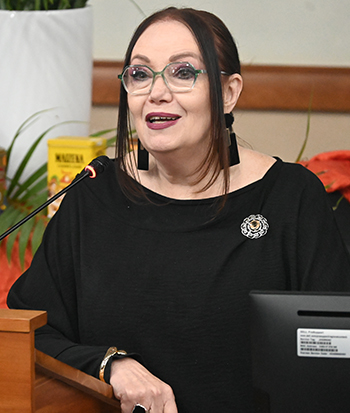The Tshwane University of Technology’s Department of Marketing, Supply Chain and Sport Management, in collaboration with Prof Mercy Makhitha from UNISA, hosted the African Marketing Academic Collaboration (AMAC) seminar on 21 and 22 August, bringing together local and international marketing practitioners and academics to discuss the importance of continuous programme reviews in response to the rapidly evolving technological landscape.
Dr Elizma Wannenburg, former Head of the Department and organiser of the event, highlighted the importance of this decade-long initiative. "Aligning qualifications is essential for ensuring seamless transitions for learners between institutions. Academic institutions must view themselves as collaborators in nurturing students' educational journeys, rather than as competitors. The key is to maintain a student-centered approach in preparing graduates who are ready for the future,” she said.
The first day of the seminar featured Dr Annelise Wissing, Curriculum Development Practitioner, who spoke on the importance of evidence-based programme reviews. "Programme reviews reveal our gaps and redundancies and provide us an opportunity to strengthen our programmes in line with what is currently relevant," she said.
Dr Wissing highlighted the concept of knowledge half-life, while stressing the need for curriculum flexibility to ensure students are equipped with the essential skills demanded by the industry.

Bianca de Beer, talking about the multifaceted skills
required in the modern marketing environment.

Delegates at the first day of the seminar.
Adding to the discourse, Bianca de Beer, Senior Marketing Manager at 1st for Women, underscored the multifaceted skills required in the modern marketing environment. "To be successful, you need to be a marketing unicorn—a pro in all things marketing," she said. She stressed the balance between creativity and commercial acumen, the importance of delivering both short- and long-term results and the necessity of maintaining curiosity in the field.
The seminar also delved into how technological innovations, such as Artificial Intelligence (AI), Augmented Reality (AR) and Virtual Reality (VR), are being integrated into marketing education, along with the importance of benchmarking the qualifications offered. During their presentations, academics from both public and private institutions stressed the importance of embracing these advancements to effectively prepare students for the future.
A key presentation, "Preparing Industry-Ready Graduates in a Digital World," delivered by Justine Nienaber, CEO of Punkystarfish – Digital Marketing Agency, shared her insights into the evolving digital landscape, which provided valuable takeaways for both educators and students.
Jayde Butler, Publisher: Marketing at Juta, presented the "Trends in Higher Education: The Shift Towards Customized Learning Materials," addressing the growing demand for personalised educational resources that cater to individual learning needs and preferences.
The event culminated in a series of discussions on modernising marketing curricula to align with industry standards and preparing students for the challenges of a digital world. Dr Paulin Tchoualak, TUT alum and Head of Digital Marketing at Promasidor and Enrico du Plessis from the Marketing Association of South Africa (MASA), along with international experts and academics from Ghana, Australia, Romania, India and Malaysia, contributed to the global dialogue on these pressing issues.
Dr Roeline Brink, TUT’s Director of Cooperative Education, highlighted the vital role of Work-Integrated Learning (WIL) in creating future-ready graduates. She emphasised the importance of collaboration between universities to provide students with a comprehensive education that bridges the gap between theory and practice.
In her closing remarks, Dr Wannenburg reiterated the importance of these collaborative efforts in shaping the future of marketing education. She called for ongoing curriculum reviews to ensure that educational offerings remain relevant and student-centered, ultimately keeping marketing as a vital component of business in an ever-changing world.

Bianca de Beer flanked by Kelebogile Ramokgopa, programme director and
Dr Elizma Wannenburg.

Dr Annelise Wissing talking about the
importance of programme reviews.
